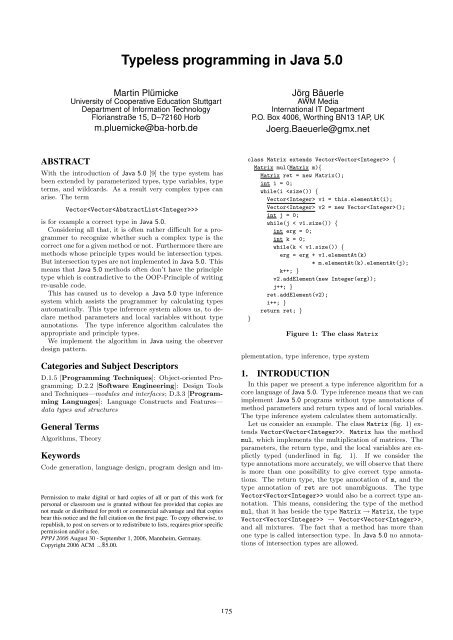4th International Conference on Principles and Practices ... - MADOC
4th International Conference on Principles and Practices ... - MADOC
4th International Conference on Principles and Practices ... - MADOC
You also want an ePaper? Increase the reach of your titles
YUMPU automatically turns print PDFs into web optimized ePapers that Google loves.
Typeless programming in Java 5.0<br />
Martin Plümicke<br />
University of Cooperative Educati<strong>on</strong> Stuttgart<br />
Department of Informati<strong>on</strong> Technology<br />
Florianstraße 15, D–72160 Horb<br />
m.pluemicke@ba-horb.de<br />
Jörg Bäuerle<br />
AWM Media<br />
<str<strong>on</strong>g>Internati<strong>on</strong>al</str<strong>on</strong>g> IT Department<br />
P.O. Box 4006, Worthing BN13 1AP, UK<br />
Joerg.Baeuerle@gmx.net<br />
ABSTRACT<br />
With the introducti<strong>on</strong> of Java 5.0 [9] the type system has<br />
been extended by parameterized types, type variables, type<br />
terms, <strong>and</strong> wildcards. As a result very complex types can<br />
arise. The term<br />
Vector<br />
is for example a correct type in Java 5.0.<br />
C<strong>on</strong>sidering all that, it is often rather difficult for a programmer<br />
to recognize whether such a complex type is the<br />
correct <strong>on</strong>e for a given method or not. Furthermore there are<br />
methods whose principle types would be intersecti<strong>on</strong> types.<br />
But intersecti<strong>on</strong> types are not implemented in Java 5.0. This<br />
means that Java 5.0 methods often d<strong>on</strong>’t have the principle<br />
type which is c<strong>on</strong>tradictive to the OOP-Principle of writing<br />
re-usable code.<br />
This has caused us to develop a Java 5.0 type inference<br />
system which assists the programmer by calculating types<br />
automatically. This type inference system allows us, to declare<br />
method parameters <strong>and</strong> local variables without type<br />
annotati<strong>on</strong>s. The type inference algorithm calculates the<br />
appropriate <strong>and</strong> principle types.<br />
We implement the algorithm in Java using the observer<br />
design pattern.<br />
Categories <strong>and</strong> Subject Descriptors<br />
D.1.5 [Programming Techniques]: Object-oriented Programming;<br />
D.2.2 [Software Engineering]: Design Tools<br />
<strong>and</strong> Techniques—modules <strong>and</strong> interfaces; D.3.3 [Programming<br />
Languages]: Language C<strong>on</strong>structs <strong>and</strong> Features—<br />
data types <strong>and</strong> structures<br />
General Terms<br />
Algorithms, Theory<br />
Keywords<br />
Code generati<strong>on</strong>, language design, program design <strong>and</strong> im-<br />
Permissi<strong>on</strong> to make digital or hard copies of all or part of this work for<br />
pers<strong>on</strong>al or classroom use is granted without fee provided that copies are<br />
not made or distributed for profit or commercial advantage <strong>and</strong> that copies<br />
bear this notice <strong>and</strong> the full citati<strong>on</strong> <strong>on</strong> the first page. To copy otherwise, to<br />
republish, to post <strong>on</strong> servers or to redistribute to lists, requires prior specific<br />
permissi<strong>on</strong> <strong>and</strong>/or a fee.<br />
PPPJ 2006 August 30 - September 1, 2006, Mannheim, Germany.<br />
Copyright 2006 ACM ...$5.00.<br />
class Matrix extends Vector {<br />
Matrix mul(Matrix m){<br />
Matrix ret = new Matrix();<br />
int i = 0;<br />
while(i





